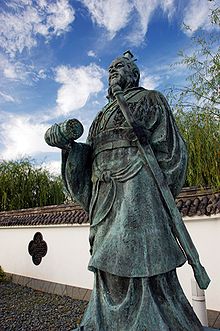Sun Tzu
- This article is about the military strategist Sun Tzu. For the mathematician of the same name, see Sun Tzu (mathematician).
Sun Tzu (544 BC – 496 BC) also called Sun Wu, was an ancient Chinese general, military expert, and philosopher. He is widely believed to have been the writer of the most important work of military strategy and theory, The Art of War.[1] His name means "Master Sun". His family name is Sun, Tzu is an honorific (title of respect) meaning "master."

Most of what is known about Sun Tzu comes from Ssu-ma Ch'ien's Shih chi, also called the Records of the Grand Historian.[2] According to Ssu-ma, Sun Tzu lived during the era called the Spring and Autumn Period of China[3] (770 to 476 BC).
Life
changeSun Tzu was born in the State of Qi (now Shandong Province).[4] This is according to the Records of the Grand Historians. However, the Spring and Autumn Annals of Wu and Yueh claim he was born in Wu.[2] Sun Tzu lived during the turbulent period of the late Chou dynasty. He grew up in a military family and he studied military science.[4] Not much is known about his childhood or early life. It is known that at some point in his life he became known as a great general and a military strategist.[5] He became a general for King Helü of Wu.[6]
Sun Tzu won battles by not actually fighting his enemy if it was unnecessary.[7] He recommended spies, deception and a commander having complete control of his soldiers.[7] When he fought, he understood warfare better than most of his opponents.[7] Sun Tzu learned to win battles with the least loss of his own men.
| “ | Be extremely subtle, even to the point of formlessness. Be extremely mysterious, even to the point of soundlessness. Thereby you can be the director of the opponent’s fate.[8] | ” |
Many historians believe he was the victor at the Battle of Boju in 506 BC.[9] The great historian Sima Qian (145/135–86 BC), writer of Shiji (Historical Record), called Sun Tzu an exceptional strategic battlefield commander.[10] He also said Sun Tzu was both flexible and had unlimited surprises for his enemies.[10] Sima Qian wrote that in his nearly 40 years as a general, Sun Tzu never lost a battle, a campaign or a war.[10]
The Art of War
changeThe Art of War was one of the earliest books on Chinese warfare. It remains one of the best known and most influential books ever written.[5] The book was widely copied in the ancient world. An early copy was discovered in 1972.[1] It was written on bamboo slats that were sewn together.[1] It became known in the Western world during the late 18th century.[11] It was translated to English only in the 20th century.[11]
At that time the rules for warfare were based on chivalry. War was the sport of rich noblemen.[12] Sun Tzu refused to see war as a sport.[12] He used Taoist principles and applied them to warfare.[12] In doing so, he changed the rules of war. Unlike generals who enjoyed long campaigns, he understood that war is serious. Sun Tzu believed that once a war started, the goal was to defeat the enemy.[12] Sun Tzu was unconventional in that he did not follow the prevailing wisdom of his time. Other generals were simply unprepared for Sun Tzu's tactics.
| “ | All warfare is based on deception. Hence, when able to attack, we must seem unable; when using our forces, we must seem inactive; when we are near, we must make the enemy believe we are away; when far away, we must make him believe we are near. Hold out baits to entice the enemy. Feign disorder, and crush him.[13] | ” |
Legacy
changeFor at least the last 2000 years, Sun Tzu has had a tremendous influence on military thinking. Ho Chi Minh was a fan of Sun Tzu. He led the Communist Vietnamese in their fight against American-backed South Vietnam.[14] The American generals Norman Schwarzkopf, Jr. and Colin Powell followed Sun Tzu's principles during the Gulf War.[14]
| “ | If you know the enemy and know yourself, you need not fear the result of a hundred battles. If you know yourself but not the enemy, for every victory gained you will also suffer a defeat. If you know neither the enemy nor yourself, you will succumb (lose) in every battle.[8] | ” |
References
change- ↑ 1.0 1.1 1.2 "Sun Tzu". Totallyhistory.com. April 8, 2013. Retrieved July 19, 2015.
- ↑ 2.0 2.1 "WHO WAS SUN TZU?". Sonshi.com. Retrieved July 19, 2015.
- ↑ "Sun Tzu". Simply Knowledge/Aatman Innovations Pvt. Ltd. Retrieved July 19, 2015.
- ↑ 4.0 4.1 Dorothy Perkins, Encyclopedia of China: History and Culture (Ambigndon, OX; New York: Routledge, 2013), p. 496
- ↑ 5.0 5.1 "Sun Tzu and The Art of War". AncientMilitary.com. Retrieved July 19, 2015.
- ↑ "Sun Tzu Biography". Famous People. Retrieved July 19, 2015.
- ↑ 7.0 7.1 7.2 "Sun Tzu's Art of War". Single Step Media. Archived from the original on February 29, 2016. Retrieved July 19, 2015.
- ↑ 8.0 8.1 Eric Jackson (May 23, 2014). "Sun Tzu's 31 Best Pieces Of Leadership Advice". Forbes. Retrieved July 19, 2015.
- ↑ Joshua J. Mark (January 4, 2013). "Sun-Tzu". Ancient History Encyclopedia Limited. Retrieved July 19, 2015.
- ↑ 10.0 10.1 10.2 China’s Many Dreams: Comparative Perspectives on China’s Search for National Rejuvenation, ed. David Kerr (New York: Palgrave Macmillan, 2015), p. 208
- ↑ 11.0 11.1 "Sun Tzu". History/A&E Television Networks, LLC. Retrieved July 19, 2015.
- ↑ 12.0 12.1 12.2 12.3 "Sun-Tzu". Ancient History Encyclopedia Limited. Retrieved July 5, 2015.
- ↑ "Sun Tzu Quotes – The Art of War". Military-Quotes.com. Retrieved July 19, 2015.
- ↑ 14.0 14.1 "The Art of War". History.com/A&E Television Networks, LLC. Retrieved July 5, 2015.